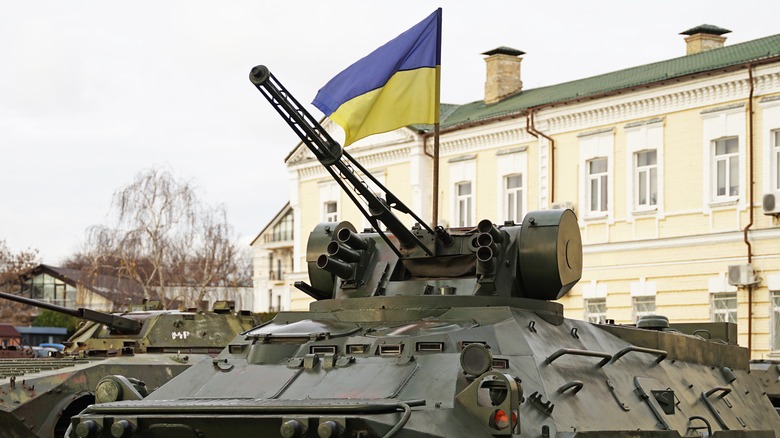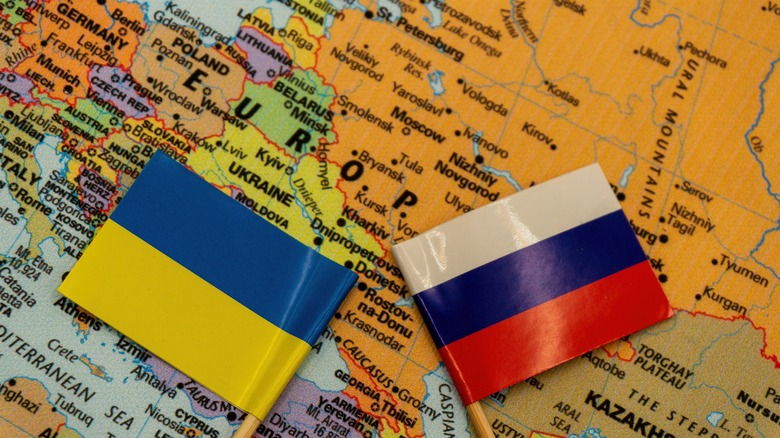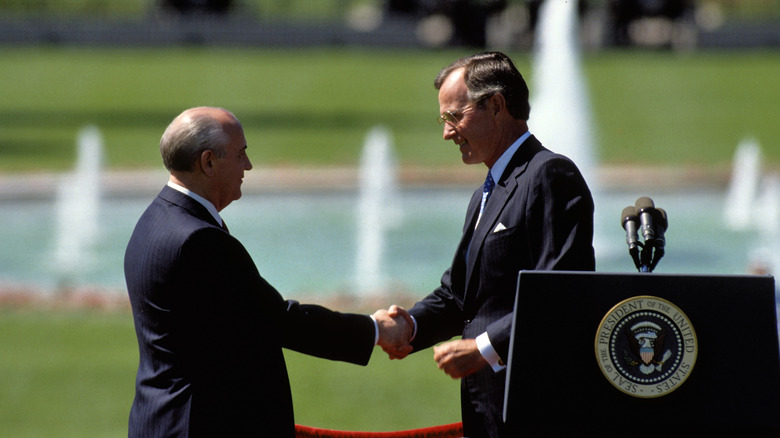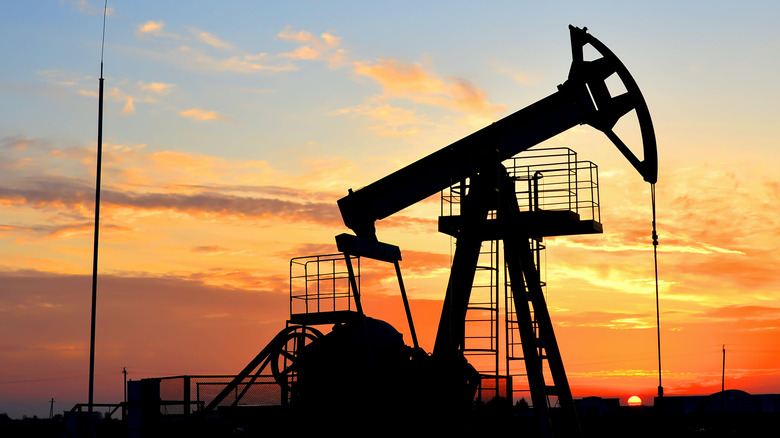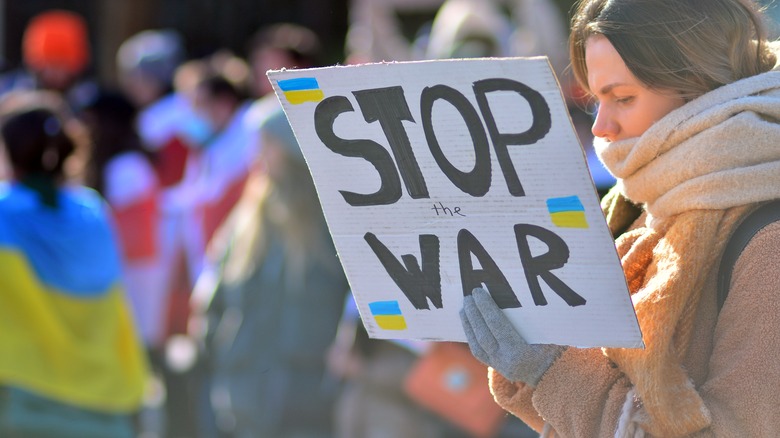The One Reason Putin Is Not A Fan Of NATO
Beginning in February 2022, the war between Russia and Ukraine took over headlines across the world. Footage of drone strikes, destroyed cities, Russian tanks — and Ukrainian civilians stealing said tanks — were seen everywhere. But it begs the question, why? Many have been asking why Vladimir Putin invaded Ukraine in the first place and what his problem is with NATO. Though there are many speculations on the matter, if you look at the data, it all has to do with geography.
Geography is the biggest factor when it comes to Putin's decision to invade Ukraine and why he has so much disdain for the NATO alliance. Looking at a map, you can see that if Ukraine were ever to be a part of NATO, this would be a huge threat to Moscow. For one, Ukraine directly borders the country and has been a key ally to Russia over several centuries, and at some times, it has even been a part of the vast empire, per National Geographic. A NATO-pledged Ukraine would be a huge personal insult to Russia, as it would mean a long-time ally joining the Western powers. Though insults aren't the main reason why geography plays a vital role in the invasion.
Being Indefensible
Historically, Russia is a vast land and holds the title of being the largest country in the world that stretches over 11 time zones. But the reason for this isn't that Russia has an exceptional military might that is able to control the whole region (we see that with the way farmers in Ukraine seem to be winning battles against conditioned Russian soldiers (via Australian Broadcasting Corporation). No, rather, the reason is that Russia is a mostly flat, open land with no natural borders. It is so large that it needs to expand far to reach land barriers that make it harder for foreign nations to invade, and a Ukraine that is a part of NATO would be a direct threat to that fear.
If Ukraine were ever to join NATO and NATO decided to invade Russia, Russia would have a very difficult time countering an invasion due to this geographical fault, as The Atlantic points out. The flat steppes and plains that dominate Russia's interior would basically be an invite for a foreign nation to invade if they ever decided to. This would rattle Russian leaders and national security advisors every night, knowing that they would be almost indefensible to an offense on their borders, especially if you're a paranoid dictator like Vladimir Putin.
Promises Broken? Who Knows
The Russian government may have some reason to be skeptical of NATO intentions as well, and that's partly due to some rather murky agreements that came during the fall of the USSR. After World War II, when the Russian Federation was still a part of the Soviet Union, the nation almost immediately entered a Cold War with the United States. Based on ideological differences between capitalism and communism, the two superpowers fought through proxy wars, intelligence operations, and covert missions to try to gain supremacy in the post-war world (via History). However, this all came to an end when the USSR collapsed in the 1990s and was followed by some messy negotiations on how the world was to be ruled.
Depending on who you ask, the issue of NATO expansion after the fall of the USSR is either the consequence of the U.S. breaking a promise or a fabrication created by the Russian government as an excuse to invade foreign nations. According to the Los Angeles Times, there was somewhat of a verbal agreement that the United States would not expand NATO into former Soviet states, but no formal, legal-binding promise was made by the American government. This lack of understanding of the actual limitations of NATO could make Moscow fear that NATO may even go as far as to take over Russia if Ukraine joins the alliance directly at its border, which is another reason geography is so important as to why Putin begrudges NATO.
It's Always Oil
When assessing the Russia-Ukraine War, it may help to see from the perspective of not what Vladimir Putin has to gain but what he has to lose by not invading Ukraine. To understand that, we must examine Russia's economy. Like most wars in the 21st century, however, it all comes back to oil and Russia's petrostate.
Russia's economy is heavily based on its fossil fuel industry, and according to Reuters, 46% of its revenue in 2020 came from the natural gas sector, with half of its exports being oil and gas. Russia's dominance over the oil industry is especially felt in places like Europe. According to BBC, 41% of the EU's natural gas imports came from Russia, with Germany being the largest importer. This dependence on Russian oil, especially from the largest powerhouse on the European continent, is what kept Russia's economy alive, but Ukraine was a direct threat to that.
Ukraine Threatens Russia's Economy
Recently, it was discovered that Ukraine might be sitting on a treasure trove of natural resources, which makes its geographical position so valuable. It currently is in second place for having the most gas reserves in Europe, only behind Russia, according to the International Trade Association. If Ukraine were to join NATO and utilize its resources, it would be a fatal blow to the Russian economy, and this fully explains why Ukraine's location is so critical and why Russia has such an issue with the possibility of them joining NATO.
The locations of these natural gas reserves make it difficult to extract, being in the Black Sea and off the Crimean Peninsula (per the International Trade Association), and we've already seen how Russia has been imperative on not letting Ukraine have easy access. If Ukraine became a viable natural gas producer, European countries would not have to rely on Russian pipelines and the messy political complications that come with trading with a brutal dictator. Russia knows this, and it is why they fear them becoming a part of NATO. If they ever did join the alliance, this would practically mean Russia could do nothing about a country right next door taking their business, or else they would face the militaristic might of the entire Western world. This is, of course, due to NATO's Article 5 in their treaty (via NATO), which states that if any NATO member is attacked, then all the other members will come to their defense.
Consequences of Paranoia
Since the war, the Western powers have united in punishing the country, which ironically lead to Russia's economy crumbling even without Ukraine becoming a full-fledged NATO member. As The Conversation says, the Russian economy is headed for collapse with crippling sanctions and the decrease in value of the Russian ruble. Understanding the reasoning for Russia's invasion can be helpful for examining future events, however, and especially looking at the role of geography in these situations.
Geography plays a role in everything from historical ties to natural resources, along with positions that affect other countries' national security, all of which are vital in how they are treated by other nations. Russia may have felt threatened by NATO expansion into Ukraine — hence the invasion — but by examining their point of view, these situations can be dealt with in a more diplomatic and peaceful manner that doesn't result in a senseless war.
